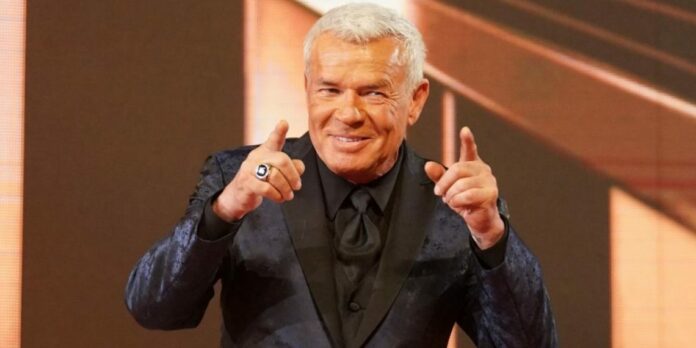
In the latest episode of “83 Weeks,” Eric Bischoff discussed Vince McMahon’s announcement of his retirement:
“When I was competing against Vince McMahon, here’s the truth. I wouldn’t have had the opportunity to do all that crap that created the Monday Night Wars and that opportunity for me to step into that moment in time when all things were working and everything was lined up and for me to be able to go head to head with Vince McMahon, that would have never happened had it not been for the vision and the footprint that Vince McMahon created. AEW, WCW, none of that would have existed had Vince McMahon not proven beyond a shadow of a doubt, in a way that the Crocketts couldn’t do, Verne Gagne couldn’t do, none of the other regional promoters who had these wild ass dreams, knew how to do it, or really had the vision to take wrestling from what it once was (to what it turned out to be). Everybody tried and said, ‘What if I do this? What if I did that?’, but Vince did it.”
“If Vince McMahon wouldn’t have done it, Ted Turner Broadcasting wouldn’t have been interested in competing with him and created the number one television show (WCW), not wrestling show, television show, each and every week. AEW would have never gotten an opportunity. So all roads lead, no matter how much you’ve enjoyed or hated, or whatever, no matter how much you’ve seen, and how much this industry has changed over the last 30 years, all of those roads lead to Vince McMahon. To deny that or not give it proper respect, I think, is a reflection on a weakness of character.”
Bischoff on the creative process to put together a television show for WWE under Vince McMahon:
“I think you’re going to see some incredibly talented people begin to do what they’re capable of doing without an almost unbearable process to do it in. What do I mean by that? It’s hard to say these things without sounding disrespectful and I don’t mean to be because Vince’s process worked. WWE is now a $5 billion public company. So let’s just keep that in mind as I’m being critical assessing the process.”
“Spending all week writing a show, presenting that show at midnight or two o’clock in the morning when your meeting was scheduled for five (in the afternoon), and you’ve waited around for eight hours. You can’t move forward with anything until you get approval with what you’ve done thus far. The creative process is a series of meetings until you get a rough draft of a show in front of Vince. You set it up Friday night, depending on what show you’re doing, of course. For RAW, you would get it done and get it to Vince Friday night, maybe Saturday morning.”
“Everybody on that writing team is standing by on Saturday morning. Been there, done that. I experienced it. Saturday morning, you get up and you’re not going anywhere because when Vince gets that rough draft, he is going to look at it, but you don’t know if he’s going to look at it Saturday morning, Saturday afternoon or Saturday night. You don’t know if he’s going to want to get on the phone with two or three of you, or maybe the whole team to go over it.”
“Let’s assume, as it was often the case, you get a tentative green light to finish it up. You get to the jet Monday morning, six o’clock in the morning, seven o’clock in the morning, whatever. You’ve got some support intern who was up all weekend long, making copies and copies and copies and copies and copies of all kinds of things. So when you get to the jet on your way to TV, there’s a stack of paperwork that Vince needs to review, and in there, is the show. He’ll review the show on the plane and maybe make some changes or suggestions, and then you get to the building.”
“When it’s time for the production meeting, you don’t know what’s going to happen. Sometimes you’re starting from scratch. Sometimes you’re doing major reconstructive surgery. Sometimes you get out of that production meeting, you get a pretty good idea what you’re going to do, there may be one or two things in the show that aren’t completely buttoned up yet, but you’re working on that and you feel pretty confident. Then you go about your business. Then the talent starts showing up. Well, certain talent has certain access, and all of a sudden, at five o’clock, you’re thinking that your show is done. But there’s been conversations happening that you didn’t know about, and the show changes. A lot. Not a little, a lot, and you’re scrambling until two minutes before showtime to get something approved.”
Bischoff also said that Stephanie McMahon will make a great CEO:
“Here’s my experience with Stephanie McMahon. There could not be a better CEO or Co-CEO of that company than Stephanie. She is amazing. I didn’t work with her directly every day, but I did work with her. I went to meetings with her. I was involved in discussions with her and our team. She is a star. She’s also, I think, very much like her father in that, ‘Look, I don’t care what you did to me yesterday or what you said about me yesterday. What can you do for me today in my business?’ She could give two shits about what you said about her on the internet 15 fu**ing years ago. What can you do for my business and do you have integrity? If you have something to offer, and you have integrity, and she trusts you, you’re going to be fine.”
You can watch the latest 83 Weeks episode below:
(h/t to WrestlingNews.co for the transcription)







